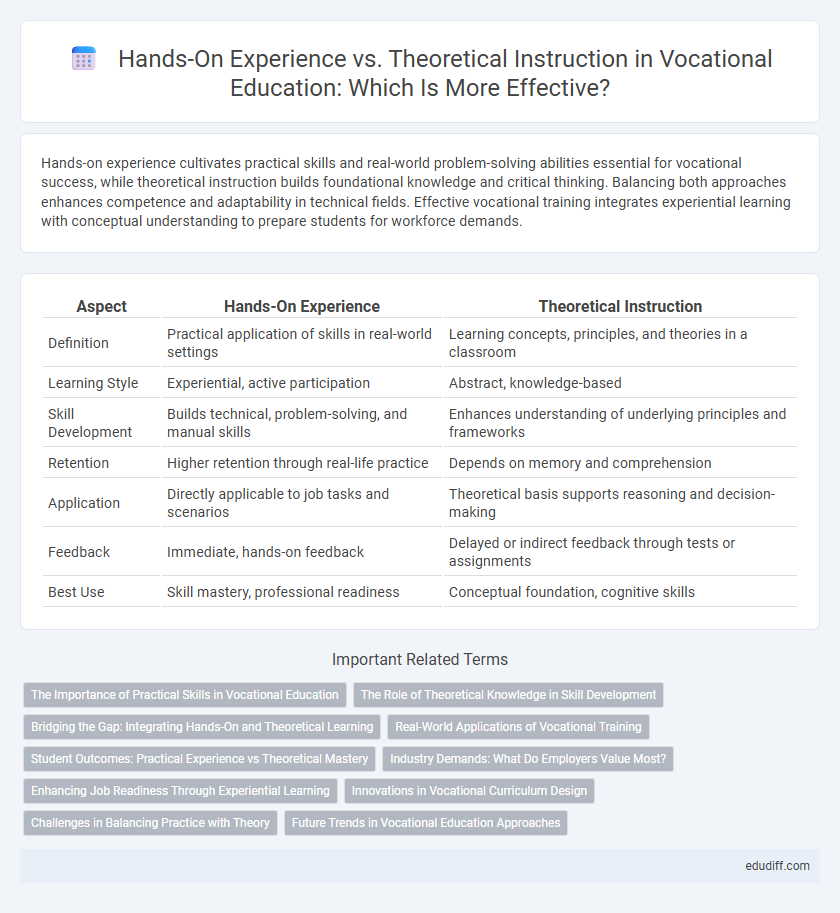Hands-on experience cultivates practical skills and real-world problem-solving abilities essential for vocational success, while theoretical instruction builds foundational knowledge and critical thinking. Balancing both approaches enhances competence and adaptability in technical fields. Effective vocational training integrates experiential learning with conceptual understanding to prepare students for workforce demands.
Table of Comparison
| Aspect | Hands-On Experience | Theoretical Instruction |
|---|---|---|
| Definition | Practical application of skills in real-world settings | Learning concepts, principles, and theories in a classroom |
| Learning Style | Experiential, active participation | Abstract, knowledge-based |
| Skill Development | Builds technical, problem-solving, and manual skills | Enhances understanding of underlying principles and frameworks |
| Retention | Higher retention through real-life practice | Depends on memory and comprehension |
| Application | Directly applicable to job tasks and scenarios | Theoretical basis supports reasoning and decision-making |
| Feedback | Immediate, hands-on feedback | Delayed or indirect feedback through tests or assignments |
| Best Use | Skill mastery, professional readiness | Conceptual foundation, cognitive skills |
The Importance of Practical Skills in Vocational Education
Practical skills in vocational education enhance student competence by applying theoretical knowledge in real-world scenarios, leading to improved job readiness and higher employability rates. Hands-on experience allows learners to develop critical problem-solving abilities and adapt to industry-specific tools and technologies, which theoretical instruction alone cannot fully provide. Employers increasingly prioritize candidates with demonstrated practical expertise, highlighting the essential role of experiential learning in vocational training programs.
The Role of Theoretical Knowledge in Skill Development
Theoretical knowledge provides the foundational principles and frameworks essential for understanding complex vocational tasks, enabling learners to grasp underlying concepts before practical application. Mastery of theoretical instruction enhances problem-solving abilities and informed decision-making in hands-on scenarios, bridging the gap between concept and practice. Integrating robust theoretical education within vocational training programs ensures skill development is both comprehensive and adaptable to evolving industry demands.
Bridging the Gap: Integrating Hands-On and Theoretical Learning
Bridging the gap between hands-on experience and theoretical instruction enhances vocational training by combining practical skills with foundational knowledge, resulting in well-rounded competencies. Integrating lab work, simulations, and real-world projects alongside classroom learning fosters deeper understanding and retention of technical principles. This blended approach aligns training outcomes with industry demands, preparing students for immediate workforce challenges.
Real-World Applications of Vocational Training
Hands-on experience in vocational training enhances skill acquisition by immersing learners in real-world applications that mirror industry standards. Practical training bridges the gap between theoretical instruction and workplace demands, ensuring students develop problem-solving abilities and technical proficiency. Employers increasingly prioritize candidates with tangible, hands-on expertise that directly translates to on-the-job performance.
Student Outcomes: Practical Experience vs Theoretical Mastery
Hands-on experience in vocational training enhances student outcomes by developing practical skills directly applicable to the workforce, increasing employability and job readiness. Theoretical instruction builds foundational knowledge and critical thinking abilities essential for problem-solving and adapting to new technologies within a profession. Balancing practical experience with theoretical mastery results in well-rounded graduates capable of both executing tasks efficiently and understanding underlying principles in their vocational field.
Industry Demands: What Do Employers Value Most?
Employers in vocational sectors prioritize hands-on experience over purely theoretical instruction, as practical skills directly impact job performance and productivity. Industry demands highlight the importance of apprenticeships and real-world training that develop problem-solving abilities and technical proficiency. Vocational programs integrating experiential learning consistently produce graduates better aligned with employer expectations and workforce readiness.
Enhancing Job Readiness Through Experiential Learning
Hands-on experience in vocational training significantly enhances job readiness by allowing learners to apply theoretical knowledge in real-world scenarios, fostering critical problem-solving skills and practical competence. Experiential learning accelerates skill acquisition, improves retention, and builds confidence, making graduates more adaptable and performance-ready in their trades. Integrating workshops, internships, and simulations within vocational curricula creates a robust pathway that bridges academic concepts with industry demands.
Innovations in Vocational Curriculum Design
Innovations in vocational curriculum design emphasize blending hands-on experience with theoretical instruction to enhance skill acquisition and job readiness. Industry partnerships and simulation technologies create immersive learning environments that replicate real-world tasks, accelerating practical competence. Data-driven approaches tailor instruction to evolving workforce needs, ensuring graduates possess both foundational knowledge and applied expertise.
Challenges in Balancing Practice with Theory
Balancing hands-on experience with theoretical instruction presents challenges such as allocating sufficient time to practical skills without compromising foundational knowledge. Vocational programs often struggle to integrate real-world applications while ensuring learners grasp essential concepts. Ineffective synergy between practice and theory can lead to skill gaps or insufficient understanding in careers like healthcare, engineering, or skilled trades.
Future Trends in Vocational Education Approaches
Future trends in vocational education emphasize the integration of hands-on experience with theoretical instruction through immersive technologies like augmented reality and virtual simulations. Hybrid learning models that combine online theoretical modules with on-site practical training are gaining prominence to enhance skill acquisition and adaptability. Industry partnerships are increasingly crucial for providing real-world project exposure, preparing students for evolving job market demands.
Hands-On Experience vs Theoretical Instruction Infographic

 edudiff.com
edudiff.com